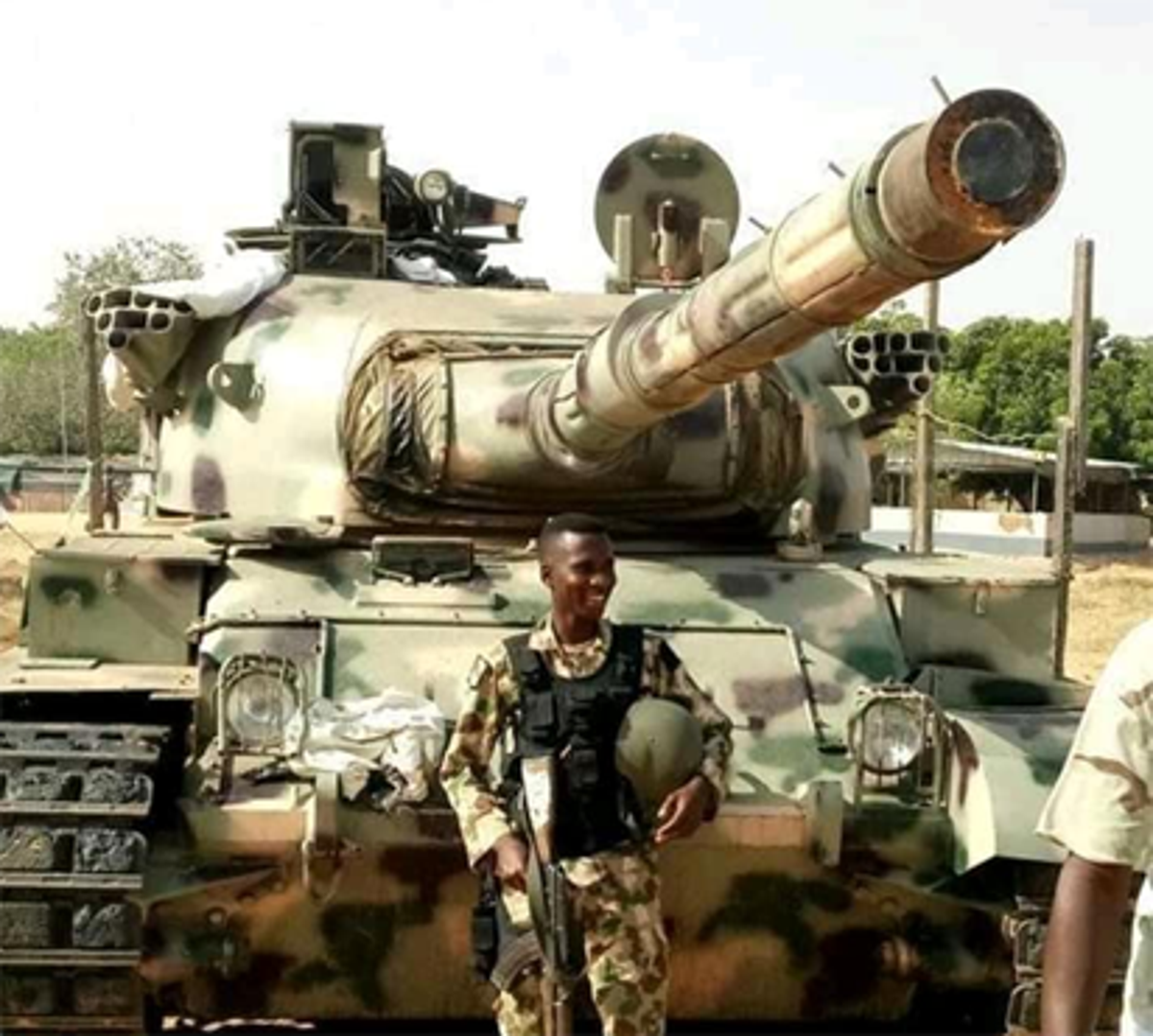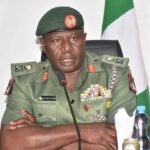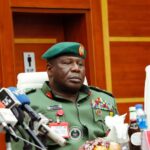When about 30 armoured vehicles procured from around the world arrived the battle-front, military high commands in Abuja thought that would soon turn the tide in the intractable insurgency in the north-east part of the country. Soon, a tally showed that 16 of those precious equipment were either destroyed or taken away by the insurgents.
The Abubakar Shekau-led Boko Haram and the Islamic State in West Africa Province (ISWAP) are using lapses in command structures on the side of the Nigerian military to inflict heavy losses on troops and convert military supplies for their own use, Daily Trust on Sunday reliably gathered.
- Nigeria-China N720bn currency swap deal on slow pace 3 years after
- Kaduna varsity begs bandits to spare students, staff
Informed sources told our correspondents that the two Boko Haram factions have for a long time largely relied on weapons confiscated from the military after sacking troops from their camps.
Data tracked by Daily Trust on Sunday show a consistent pattern of attacks on military formations around the terrorists-infested areas in Borno, Yobe and Adamawa states. During such attacks, armouries, vehicles and food supplies are usually looted.
For instance, between 2018 and the first quarter of 2021, the two factions of the Boko Haram have raided at least 38 military formations in the North East and in most instances carted away military hardware.
Insiders and security watchers say far too many raids have been launched on some military formations that have not been reported by the media. This is besides hundreds of troops killed by the terrorists during such attacks.
Our correspondents report that recent attacks on military formations are a continuation of a deeply entrenched onslaught on Nigeria’s security architecture in the North East.
It started with attacks on police stations after the Shekau-led Boko took up arms against the Nigerian state especially from 2019, from where the insurgents made up their first stockpiles of arms.
The terrorists thereafter “descended” on military formations, making it easy to refill their armouries as they continued with their war of attrition.
Experts say defensive strategy often used by the military in holding on to positions is a major loophole being explored by the terrorists in launching attacks on the sentry troops.
Another major cause of the frequent failure of the troops is said to be in the choice and deployment of officers, especially frontline commanders leading the men.
Preferential posting of some officers and favouritism is also affecting troops’ morale and discipline. This, insiders say, has roots from recruitment into the elite Nigerian Defence Academy (NDA) where VIPs corner the admissions.

Getting arms with ease
There is a general consensus among security experts that even though the two factions of the Boko Haram capitalize on Nigeria’s porous borders to bring in arms, they nonetheless get large chunk of their fighting equipment by attacking military formations.
Nigeria is bordered by Benin, Cameroon, Chad, and Niger and shares maritime borders with Equatorial Guinea, Ghana and São Tomé and Príncipe.
With an area of 923,768 km², the troubles in Sudan, Libya and Chad, occasioned by shortage of manpower to protect its borders especially in the Lake Chad region, make Nigeria increasingly vulnerable to arms proliferation.
“But beyond the crises in our neighbouring countries and our porous border is the problem within our military system,” said Salihu Bakhari, a retired military officer and a security expert with deep knowledge of happenings in the North East.
“Go and review all the videos of the guns, APCs, rocket launchers, gun trucks, Hilux vehicles and other weapons being used by the Boko Haram. You will see that they took them from our troops.
“The terrorists have in the past ten years raided hundreds of military formations and whenever the troops ‘tactically withdraw’, the attackers simply take all the arms left behind by the troops,” Bakhari said.
He said the introduction of Super Camps Strategy (SCS) by the former Chief of Army Staff (COAS), Lt. Gen. Tukur Buratai, did not help matters.
Daily Trust on Sunday recalled that In July 2019, the military high command ‘improvised’ the concept of SCS as a result of multiple factors, including continuous attacks on the scattered Forward Operations Bases (FOB) of the military.
Over time, the FOBs, situated in villages and smaller towns especially in northern and southern parts of Borno State, became vulnerable to attacks because of inadequate manpower and equipment.
The Super Camp Strategy led to the establishment of few well-constructed military strongholds. It brought to the end the concept of smaller military outposts with a higher probability of being attacked by Boko Haram invaders.
About 12 of such camps were established by the military but findings revealed that many of them have been attacked by the terrorists in the last two years and key military assets carted away.
Over 70% of military weapons end up with Boko Haram
One source disclosed that over 70 per cent of the weapons and other military equipment procured by the federal government to fight the insurgents end up in the hands of the Boko Haram forces.
He said routine pictures from operations released by the military often show officially branded vehicles as “recoveries” from the insurgents.
The situation, sources say, has become a huge headache and dilemma for the top echelon of Nigerian security architecture.
“There is now a big debate going on for and against deployment of more weapons. It is a dilemma because you cannot afford to have ill-equipped troops but the big question is of what use is procuring more weapons when we know that most of it will end up in the hands of the insurgents,” a source said.
Another intelligence source said, “I won’t be able to put a percentage on the quantity of arms and other equipment that the terrorists have snatched from our military and other security agencies.
“However, it could be within the range of 50 per cent now compared to 2012-15, where it could be said to be about 65 per cent. These were failures of commands and the lack of patriotism and professionalism.
“Failure of commands is due to inexperience on the part of some of the commanders in the field because when confronting the terrorists, most of the commanders lack the desired field experience to turn the tide against the well organised, motivated terrorists, due to their religious ideological training and drugs the influence.
“Most of our troops, due to the nature of the recruitment process, training and equipment shortcomings, are always willing to take to their heels and abandon all arms/ammo at their procession,” he said.
Two security sources told Daily Trust on Sunday that the Air Force’s renewed vigour is helping in boosting the morale of ground troops as fighter jets are sent on missions even at night when there is overwhelming attack.
The Air Force is also expected to launch a convert unmanned aerial vehicle with a capacity to carry out solo missions on targets very soon.
On his part, public affairs analyst, Abubakar Mohammed Kareto, said Boko Haram insurgents had in the past few months displayed some worrisome caches of arms and ammunition stolen from military formations even after the troops had claimed such attacks were repelled.
“We may not completely rule out the possibility of Boko Haram getting their weapons from Libya and other war ridden African countries, but it is glaring that each time Boko Haram and ISWAP overpowered a military base, they seize caches of assault rifles and hundreds or thousands of rounds of ammunition they could use in later strikes. This has fuelled their bloody rebellions for over a decade now.
“The video released by ISWAP on the recent attack on Damasak have exposed the fact that the vehicles used for the attack were seized from police and the army.
“We have also seen the recently released pictures by Boko Haram of seized vehicles from the military in Dikwa,” he said.
On how to turn the tide against the terrorists, Kareto said, “preventing unexpected battle losses is almost impossible for peace operations; we have seen many instances in Mali, Somalia and other terror ridden places.
“But they (Nigerian Armed Forces) must do more to ensure that arms and ammunition are not diverted or lost through other means, such as abandonment, illicit transfers, corruption and poor management of recovered material.
“The Nigerian Army can also strengthen the security around its military-bases to prevent infiltration by Boko Haram.”
Lake Chad strategic for insurgents
Another source said there is a need for re-strategize and re-assess the operations against the terrorists, saying the Lake Chad Basin is strategic to Boko Haram in term of getting the supply of weapons from Libya.
The source explained that some of the weapons being deployed by the insurgents came through Nigeria’s porous borders. He, however, confirmed that troops had abandoned weapons severally after heavy attacks by insurgents.
The source noted that if the military must win the war, they need to bring in some of their finest officers who had performed well. “It is disturbing to see Boko Haram using stolen weapon from the troops,” he said.
The Secretary- General of Retired Military Veterans Federation of Nigeria, Dr Awwal Abdullahi Aliyu, said the source of arms and ammunitions for Boko Haram is a double edge sword as they come from within and outside the country.
Dr Aliyu said: “It used to be external after the fall of Libya and other African countries that had security issues. Most of the weapons came across our borders through Niger, Chad and Cameroon but after the Joint Military Task Force of the West African region, their supplies got short.”
He said it was because of the shortage of supply that forced Boko Haram to resort to attacking military formations within their area of operation to cart away weapons and vehicles.
“So, at the beginning, to a large extent, they were using arms and ammunitions that were brought in from outside the country but most recently, they have been attacking and carting away machineries of the armed forces,” he said.
Aliyu, who is also the Deputy National Coordinator of Retired Members of Nigerian Armed Forces, however, said this is not to say that most of the weapons used by the insurgents presently were those carted away from military formations as the terrorists were still operating with a good number of the arms that infiltrated the country’s porous borders.

Faulty recruitment and status symbol
Most of the experts that spoke to Daily Trust on Sunday said to win the war against the Boko Haram, the federal government must prioritize competence and interest in the recruitment of officers and men of the armed forces.
They said the issue of corruption, favouritism and nepotism must be halted; while young men who are willing to serve their father land should be allowed to join the service.
Allegations are ripe that only the children of governors, ministers and top traditional rulers make it to the NDA, while for ordinary Nigerians to join the lower ranks in the army, navy or air force, they must have somebody to give them a note.
Speaking on this, Dr Aliyu said assertions that there is political influence that goes into the recruitment into the NDA is true adding, “Even at the recruitment level where you have other ranks, the same thing is at play because in Nigeria today, it is in the armed forces and other uniform cadre that recruitment is regular. Youths today just want to get a job not because they are committed to defending the nation and even the recruitment itself, the number of officers recruited into the armed forces is inadequate.”
To end the 12-year warfare with Boko Haram, Dr Aliyu said Nigeria must not only recruit adequate security forces to tackle insecurity in all the regions of the country but must also capitalize on intelligence gathering.
“This must not be left to the security forces alone, Nigerians must provide basic and necessary intelligence for the armed forces to succeed. I will also advise the Defence Headquarters to also engage the retired members of the Nigerian Armed Forces and other sister security agencies that have served and left because they live in the communities and interact with the people…They know a lot that the serving personnel may not know,” he said.
Commanders directing troops through phones from Abuja
On the claim that senior officers born with golden spoon don’t stay at the battle front, one of our sources said, “It is an open secret that a number of commanders, who happened to be from privileged families, abscond from their areas of command at will.
“There are cases of commanders directing troops through their phones from Abuja or other places,” the source said.
He said the privileged backgrounds of such officers make it difficult for discipline to be enforced.
Another source said, “Some of the troops believe that the war is imposed on them and would not be sacrificed for what does not concern them. Therefore, it won’t be out of place to place emphasis on recruiting more indigenes of the communities where the terrorists operate from to confront them.”
According to the source, “Political influence in recruitment process is an age old issue, and unless the military and other security agencies have people who would call a spade a spade, it would be difficult to cut the political influence from our recruitment process.
“With the conversation of the NDA into a degree awarding institution, most elite want their wards to have automatic employment which the military provides.
“Even in the means of deployment, the same elite insist on their wards posted within none threat or violent areas.
This is the true reflections of our fighting lives, and it does have morale side effects to those who are constantly being posted to the war theatre,” he said.
On his part, Kareto said, “The recruitment process into the army has always been poorly managed; there has been wide spread irregularities as alleged by applicants.
“Those involved are always accused of receiving bribes during the exercise. Children of highly placed individuals are the major beneficiaries of NDA admissions, those who don’t have connections are often dropped no matter their qualifications.
“We can’t get the best result when we drop merit and accept candidates into army based on nepotism, or when money exchange hands. The military needs to cleanse the process. This is the first step in attaining success in battle,” he said.
Ransom payment empowers insurgents
Dr Theophilus Abbah, who did extensive study of terrorism for his doctoral thesis, explained that the size of the Nigerian fighting forces vis-a-vis the country’s size was lamentable. He also bemoaned incessant ransom payments which, he said, boosts activities of the terrorists.
“For a country that is actively at war against terrorists, bandits, armed robbers, kidnappers, and even separatists, the size of the Nigerian Army is too little. Pakistan is fighting terrorists, just as Nigeria does. The size of Pakistani army is put at 1,204,000, while it has reserve of about 550,000. But Nigeria, as at 2019, is said to have only 120,000 fighting forces.
“Going by the spate of attacks in Nigeria, one could say terrorism is worse in Nigeria that it is in Pakistan. But with its size, the Pakistani Army can overwhelm terrorists in its territory. But in Nigeria, we have seen that terrorists and bandits have overwhelmed our military,” he said.
Dr Abbah said there is need for massive recruitment of soldiers. He suggested proper training and conversion of those already helping the security forces into the mainstream.
On sourcing of weapons, Dr Abbah also mentioned the possibility of the insurgents relying on the cache of weapons the routinely capture from government troops for action. He however proposed a close watch at Chad as a major supply base.
“Most times we are consoled that Boko Haram uses weapons stolen from Libya. It may be true, but we have a buffer country – Chad. The late Chadian President Idris Deby had battled forces supported by Libya to a standstill, so I feel it would be a difficult task for terrorists to smuggle as much weapons as Boko Haram has used through his country,” he said.
It’s not true – Army, says more troops underway
In its reaction, Nigerian Army said it was untrue to say that the Boko Haram insurgents were using weapons and equipment belonging to the military in its campaigns.
Army spokesperson, Major General Mohammed Yerima, told Daily Trust on Sunday that the insurgents have their own sources of weapons “from Libya and Mali”.
On manpower, he said the army has constantly recruited and will soon inject fresh 7,500 into the fighting force.
Gen Yerima also denied allegations that some privileged officers abscond from their duty posts in the frontline.
“That is not possible. Nobody posted to any command, under this current leadership would dare not go. We have also not declared anybody as deserter. If we have a case of desertion we have our process and we will catch whoever is it and try the person.”
By Abdulaziz Abdulaziz (Abuja), Lami Sadiq (Kaduna) & Olatunji Omirin (Maiduguri)

 Join Daily Trust WhatsApp Community For Quick Access To News and Happenings Around You.
Join Daily Trust WhatsApp Community For Quick Access To News and Happenings Around You.


